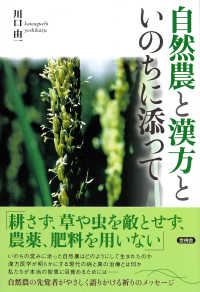Full Description
The analysis and understanding of multilingualism, and its relationship to identity in the face of globalization, migration and the increasing dominance of English as a lingua franca, makes it a complex and challenging problem that requires insights from a range of disciplines. With reference to a variety of languages and contexts, this book offers fascinating insights into multilingual identity from a team of world-renowned scholars, working from a range of different theoretical and methodological perspectives. Three overarching themes are explored - situatedness, identity practices, and investment - and detailed case studies from different linguistic and cultural contexts are included throughout. The chapter authors' consideration of 'multilingualism-as-resource' challenges the conception of 'multilingualism-as-problem', which has dogged so much political thinking in late modernity. The studies offer a critical lens on the types of linguistic repertoire that are celebrated and valued, and introduce the policy implications of their findings for education and wider social issues.
Contents
1. Towards interdisciplinarity in multilingual identity research: Differing perspectives and common ground Wendy Ayres-Bennett and Linda Fisher; Part I. Situated Multilingualism and Identity: 2. 'Every line is a lie': The geographical and cognitive mapping of multilingualism and identity John E. Joseph; 3. Beyond 'narrating the nation': Cultural producers and multilingualism in wartime Ukraine Rory Finnin and Ivan Kozachenko; 4. Metrolingual practices and distributed identities: People, places, things and languages Alastair Pennycook and Emi Otsuji; 5. Migrants' identities in multilingual cities: Plurilingualism as transformative social asset Cécile Sabatier Bullock; 6. Indexicalities in the multilingual city: Listeners' perceptions of urban vernacular French Janice Carruthers and Daniel McAuley; 7. Multilingualism and identity in Ningbo, China: A case study Hui Zhao; Part II. Multilingual Identity Practices: 8. Decolonizing languages in rural settings: Towards equatorial epistemologies Alison Phipps; 9. Seeking methodological rigour in language and identity research: Applying a version of positioning theory to a research interview excerpt David Block; 10. Translation, identity and translanguaging: Perspectives from a global literacy initiative Liam Doherty, Bonny Norton and Espen Stranger-Johannessen; 11. The complexity of identities: Insights from EMI educators' multilingual identities Sarah Mercer and Kyle Read Talbot; 12. Narrating heterogeneous identities in multilingual communities Sabina Perrino and Stanton Wortham; Part III. Multilingual Identity And Investment: 13. Multilingualism(s), globalization, and identity: Learning 'Chinese' as an additional language Patricia A. Duff; 14. Who are the multilinguals?: Pupils' definitions, self-perceptions and the public debate Asta Haukas; 15. Multilingual identity construction through participative reflective practice in the languages classroom Angela Gayton and Linda Fisher; 16. Young children's language attitudes with implications for identity in a US dual-language immersion classroom Alison L. Bailey; 17. Language, identity and empowerment in endangered language contexts: Māori and guernesiais Julia Sallabank and Jeanette King; 18. Afterword: The complementarity of multilingualist and 4T approaches John E. Joseph.

![Storia e teoria della serialità (Nautilus [nuova serie], 23) 〈[nuova serie], 23〉](../images/goods/../parts/goods-list/no-phooto.jpg)





